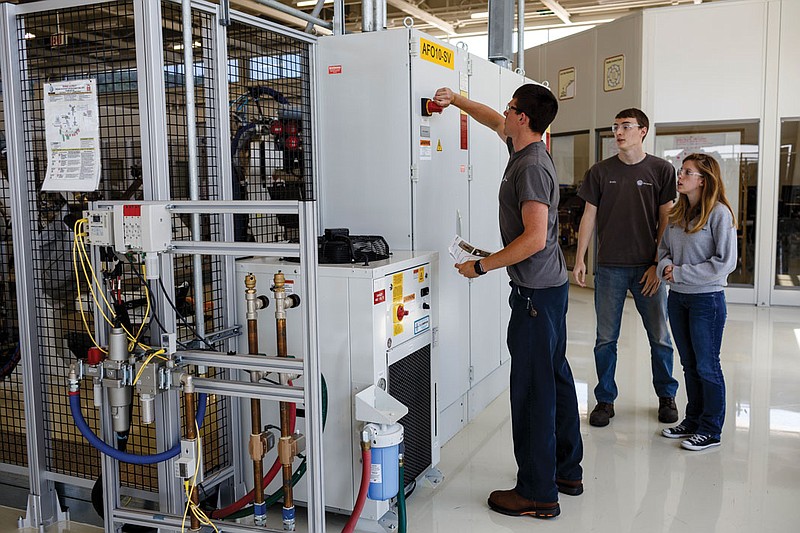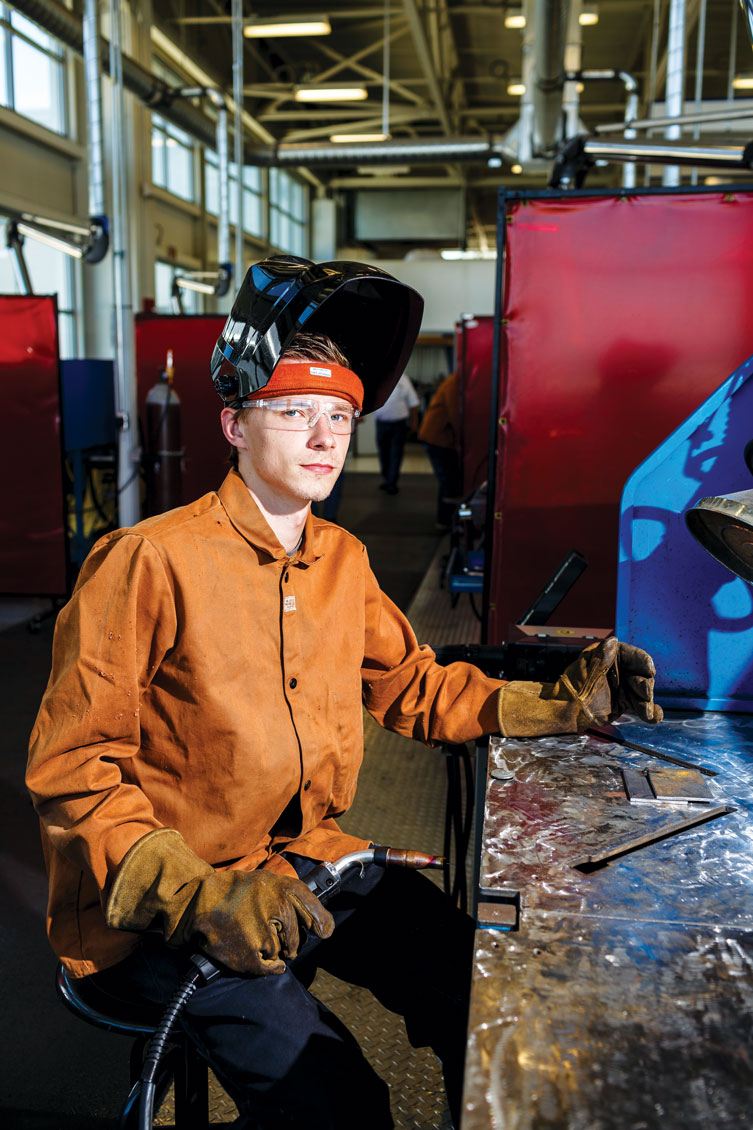My goal in life is to put my name on something. I want to be able to say 'I did this.'
When the staff at the Volkswagen Academy's mechatronics program in Chattanooga talk to potential recruits to the apprenticeship initiative, they try to learn a key piece of information.
"What we like to say is 'If you've gotten into trouble taking stuff apart, that's the student we want," says Ralph Gwaltney, coordinator of the academy program located at the German automaker's assembly plant.
The training at Volkswagen is seen as vital as the carmaker seeks to fill the highly skilled jobs maintaining and fixing the factory's robots and other technical posts. With unemployment low, some manufacturers are finding it challenging to find qualified candidates to fill positions.
Chattanooga State Community College last year helped about 100 companies in the region with their workforce training needs, says Lulu Copeland, the executive director of economic and workforce development at Chattanooga State. Copeland says the current high-employment economy offers an opportunity for companies to train employees to help the companies grow.
VW has joined with the college and Hamilton County Schools to create several programs aimed at helping the carmaker find and train future employees. Its automation mechatronics program, along with another that produces car technicians to work on the body, mechanical and electrical and electronic systems in VW vehicles, offer three years of both classroom and on-the-job training.
Gwaltney, who is employed by Chattanooga State, says that when students graduate, they've had five academic semesters and four on the plant floor, where they're paid by VW.
Mario Duarte, the VW plant's senior manager of organizational development, says they focus a lot on learning and doing.
"It helps in retention," he says. "You learn and you do."
Albert Graser, a VW technical training supervisor, says the work at the plant and inside the Volkswagen Academy teaches the students the VW culture. He said 100 percent of the graduates are offered mechatronics jobs in the factory, which start at $23 per hour.
Daniel Kowalik, 20, who's in his second year in automotive mechatronics, says he wanted to enter an initiative that would offer him a lot of experience.
"It looked like it would be a good opportunity," he says, potentially leading to a job. "There's a lot of opportunity here."
Nathan Ramin, 30, had 15 years of heating and air-conditioning work experience before deciding to enter the world of mechatronics at VW.
"I wanted to take a step up," he says. "It was an opportunity with a tier one manufacturing company."
Dason Green, 20, says he has found the mechatronics work challenging.
"They're teaching us stuff we hadn't done before," he says. "Some things it takes me time to learn."
Shelby Dreifke, 24, is working as an engineering specialist trainee, which is an 18-month program that highlights hands-on experience in the mechatronics program coupled with three months of international experience for VW in Germany along with spending time inside the assembly plant.
"My goal in life is to put my name on something," she says. "I want to be able to say 'I did this.'"
Lyn Potter, interim dean of engineering and information technology at Chattanooga State, said there's a high demand from companies in the Chattanooga area for an advanced manufacturing workforce. In June alone, Chattanooga State had at least three advanced manufacturing initiatives ongoing at its Amnicola Highway campus.
An Advanced Manufacturing Academy for graduating high school seniors, funded by a Tennessee Department of Education grant, hosted teenagers from counties in the region, Potter says.
They toured Southern Champion Tray, the Chattanooga-based paperboard packaging products maker, she says. Also, representatives from about 10 companies came in to talk with the students, Potter says.
"We have five companies which have intern opportunities ... paid internships," she says. "We hope this will encourage students to go into an advanced manufacturing career field and come to Chattanooga State to complete a degree."
In addition, the college offered a STEM Day (science, technology, engineering and mathematics) for students in grades seven through 10.
"We hope to capture their interest," Potter says, noting that manufacturing is often different than in the past in that it's clean and high tech. "You do something different every day. You use creative and thinking skills, and there's room for advancement."
Wacker, the big German chemical company with a new polysilicon plant in Bradley County, established an institute on the Chattanooga State campus to help train its workforce.
The company in June broke ground on construction of a second plant at the site to turn a byproduct of its polysilicon production into pyrogenic silica, an agent used in a wide range of products from toothpaste to cosmetics to paint. Wacker plans are to use the institute to help train its new plant workers.
Mary Beth Hudson, Wacker's site manager in Charleston, says the new jobs which include chemical operator and engineering positions will pay from about $50,000 to $70,000 annually. The new plant is expected to add about 60 jobs to the 650 already working at the site.
The institute offers apprenticeship programs which provide not just classroom training but on-the-job experience, Potter says.
"These skills for Wacker can transfer to almost every kind of manufacturing plant," she says. "It's not just training for Wacker but for all of Chattanooga."
Copeland says companies often search out Chattanooga State for training, and the college puts on job fairs where it invites businesses.
"It's another way to connect with them," she says.
A program that just finished its first year at VW involved instructing a group of 26 high school students who complete their last two years of study at the academy, finishing with not just a diploma but college credits from Chattanooga State.
Along with high school coursework, the students take such classes as industrial equipment, computers for engineering technology and programmable logic controls.
Instructor Debra Weiss says that upon completion, the students can enroll in any college program, finish Chattanooga State or complete the training in VW's mechatronics program and ultimately receive an associate in applied science in mechatronics.
Gage Cahill of East Hamilton High School, says he likes the program because he gets a jump start on his college education. He says when he found out about the program, he was excited because it offers smaller classes where it's easier to focus with more kinds of learning.
Ailyn Martinez of Tyner Academy says she likes the more hands-on experience she receives at the Volkswagen Academy.
"There's less drama" than at a typical high school environment, she says. "Everybody gets along."
Garrett Gregory, also of East Hamilton, says he wants to be a mechanical engineer and work for a manufacturer.
"I want to go somewhere so I can use my skills," he says.
Cameron Gardner, also of East Hamilton, says he'd like to do something with computers when he finishes school.
Working for Volkswagen is fine if that works out, he says, and he'd enjoy traveling to other locations where the automaker has production plants worldwide.
Automation threatens half of all existing jobs
As many as 1.4 million Tennesseans, or nearly half of all current workers, are susceptible to losing their jobs to automation, according to a job assessment report prepared in 2016 for Tennessee’s Department of Economic and Community Development.The study called the “Tennessee Workforce Disruption Index” says automation doesn’t eliminate the need for labor; it changes the way the workplace is configured, and makes new demands on educational facilities on how the workforce should be trained.“History demonstrates that a shift toward heightened technological demands of the business community does not likely coincide with declining demand for labor,” says Sally Haar, director of the Center for Economic Research in Tennessee and one of the authors of the study. “Automation of workplace tasks will displace workers, but not replace workers.”Randy Boyd, the former commissioner for Economic and Community Development in Tennessee, said automation trends underscore the need of Tennessee to push its Drive to 55 initiative, which has a goal of raising post-secondary educational attainment in Tennessee from the current 37 percent of the population to at least 55 percent.“The people who are at risk don’t have post-secondary skills,” Boyd says. “The bad news is that if we do nothing, 1.4 million people — or 50 percent of our workforce — could lose their jobs. But if we succeed, not only will there be jobs, those jobs will create additional income — $9.3 billion annually. So if we fail, it’s cataclysmic. If we succeed, it’s glorious.”The top occupations in the state where 70 percent or more of the jobs could ultimately be lost to computerization and automation include:1. Laborers and freight, stock and material handlers, 90,239 workers with an average hourly wage of $12.54 in 20152. Retail salespersons, 89,873 workers with an average hourly wage of $12.21 in 20153. Cashiers, 74,748 workers with an average hourly wage of $9.32 in 20154. Food preparation and fast food service workers, 65,405 workers with an average wage of $8.74 in 20155. Team assemblers, 62,203 workers with an average wage of $15.01 in 20156. Office clerks, 53,806 workers with an average pay of $14.36 in 20157. Waiters and waitresses, 53,007 workers with an average hourly pay of $8.99 in 20158. Heavy and tractor-trailer truck drivers, 50,101 workers with an average hourly pay of $19.68 in 20159. Secretaries and administrative assistants, 49,329 workers with an average hourly pay of $14.82 in 201510. Bookkeeping, auditing clerks, 31,441 workers with an average hourly pay of $17.07 in 2015Source: Tennessee Workforce Disruption Index, Center for Economic Research in Tennessee

